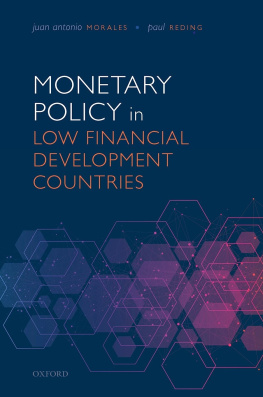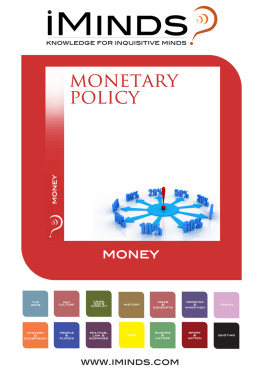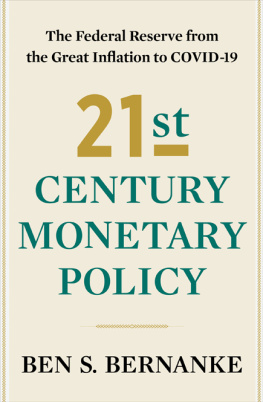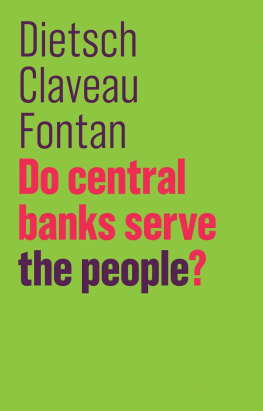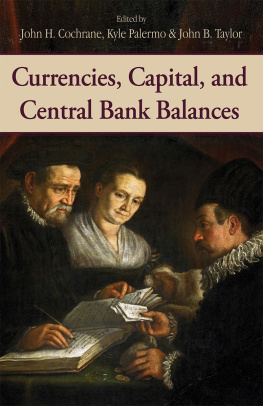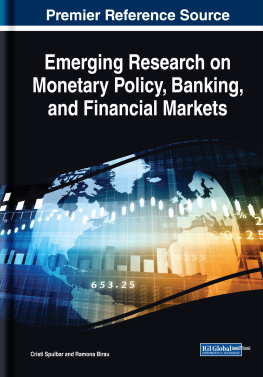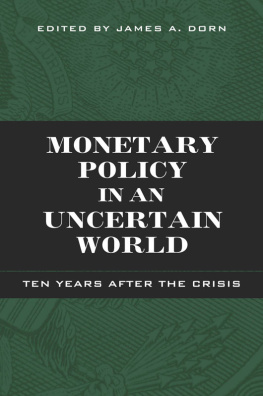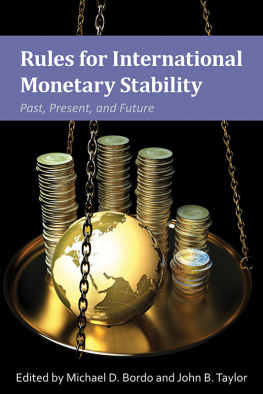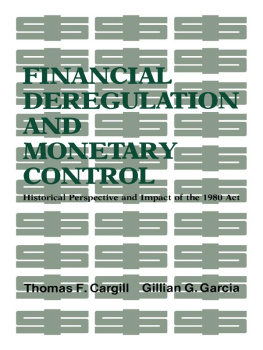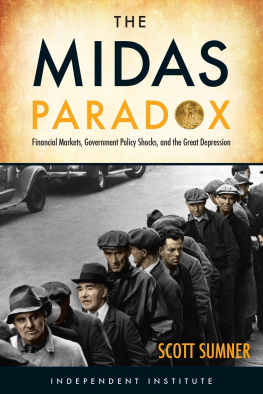Monetary Policy in Low Financial Development Countries

Great Clarendon Street, Oxford, OX2 6DP, United Kingdom
Oxford University Press is a department of the University of Oxford. It furthers the Universitys objective of excellence in research, scholarship, and education by publishing worldwide. Oxford is a registered trade mark of Oxford University Press in the UK and in certain other countries
Juan Antonio Morales and Paul Reding 2021
The moral rights of the authors have been asserted
First Edition published in 2021
Impression: 1
All rights reserved. No part of this publication may be reproduced, stored in a retrieval system, or transmitted, in any form or by any means, without the prior permission in writing of Oxford University Press, or as expressly permitted by law, by licence or under terms agreed with the appropriate reprographics rights organization. Enquiries concerning reproduction outside the scope of the above should be sent to the Rights Department, Oxford University Press, at the address above
You must not circulate this work in any other form and you must impose this same condition on any acquirer
Published in the United States of America by Oxford University Press
198 Madison Avenue, New York, NY 10016, United States of America
British Library Cataloguing in Publication Data
Data available
Library of Congress Control Number: 2020952114
ISBN 9780198854715
ebook ISBN 9780192597021
DOI: 10.1093/oso/9780198854715.001.0001
Printed and bound by
CPI Group (UK) Ltd, Croydon, CR0 4YY
Links to third party websites are provided by Oxford in good faith and for information only. Oxford disclaims any responsibility for the materials contained in any third party website referenced in this work.
A Ccile et Genevive
qui par leur soutien et leur patience ont permis la ralisation de ce livre
Preface
The book is the outgrowth of the course Macroeconomic and structural adjustment: monetary and financial aspects taught for many years by Paul Reding at the University of Namur in the Specialized Master in International and Development Economics. This programme is jointly organized by the University of Namur (UNamur) and the Catholic University of Louvain (UCLouvain), with the support of the Commission for Development Cooperation of the Belgian Acadmie de Recherche et dEnseignement suprieur (ARES). Most of the students enrolled in the programme come from developing countries. Juan Antonio Morales participated as invited academic scholar over several years, teaching parts of the course and letting students benefit from his wide experience in policy-making, having served as President of the Central Bank of Bolivia for more than ten years.
Based on the experience with successive cohorts of students, both of us found it worthwhile to develop further the material prepared for the course and to extend it into a book. True to its pedagogical roots, the book is set at an intermediate level. When it refers to a theoretical analysis, top priority is given to economic intuition. It employs little mathematical formalization, without sacrificing rigour. It relies widely on empirical illustrations, and backs the discussion with case studies. We hope that this perspective, as well as the depth and width that we have endeavoured to give to the book, will be of interest to lecturers and students as well as to scholars, practitioners. and other readers, curious about the role and characteristics of monetary policy in developing countries, especially in those which face specific challenges because of their incomplete financial development.
Preparing the book has been an adventure for both of us. It was been shaped during many short-term visits by Juan Antonio to Namur, at the department of economics, and by Paul to La Paz, at the department of Maestras para el Desarrollo of the Universidad Catlica Boliviana (UCB). It is the fruit of numerous exchanges, face to face or over the internet, through which we have developed our analysis, drawing on our respective strengths and experiences, organized the discussion, and crafted the presentation of the issues this book is about. The book has also benefited from extended discussions with colleagues, in particular during seminars that we have respectively given in Namur and La Paz. Interactions with our students, which we were fortunate to experience over so many years, have been a very strong encouragement to complete the book. This valuable support from our colleagues and students from both universities is gratefully acknowledged.
Financial support by ARES of the Specialized Master in International and Development Economics allowed Juan Antonio to teach in the programme and, ultimately, triggered the book. This support is gratefully acknowledged, as well as the support of UNamur and of the Belgian Fonds National de la Recherche Scientifique (FNRS), which allowed Paul to make several research stays at UCB in La Paz. The Tinker Foundation and the IIE Scholar Rescue Fund gave Juan Antonio the opportunity to discuss his experiences and ideas with colleagues and students at the Institute of Latin American Studies at Columbia University in New York while he was a visiting professor.
Contents
aggregate demand
advanced economy
autonomous liquidity position
Banque Centrale des tats de lAfrique de lOuest (Central Bank of WAEMU)
Banque des tats de lAfrique Centrale (Central Bank of CEMAC)
central bank digital currency
central bank independence
Communaut conomique et Montaire de lAfrique Centrale (Central African Economic and Monetary Community)
Centro de Estudios Monetarios Latino Americanos (Center for Latin American Monetary Studies)
Communaut Franaise dAfrique (French African Community)
covered interest parity
Chiang Mai Initiative
consumer price index
dynamic stochastic general equilibrium (model)
East African Community
European Central Bank
Eastern Carribean Currency Union
Economic Community of West African States
emerging market economy
European Monetary Union
financial development
Fondo Latinoamericano de Reservas (Latin American Reserve Fund)
forecasting and policy analysis system
Federal Reserve Board
fiscal theory of the price level
foreign exchange
gross domestic product
governments intertemporal budget constraint
high income
International Monetary Fund
international reserves
impulse response function
inflation targeting
liquidity coverage ratio
low financial development country
low income
Low income country
lower middle income
lender of last resort
money stock (narrow definition)
money stock (broad definitions)
micro-financial institutions
monetary policy rate
monetary transmission mechanism
monetary union
net domestic assets
net foreign assets
non-governmental organization
net international reserves
New Keynesian Phillips curve
non-monetary financial intermediary
optimal currency area
open market operation
overnight interbank rate
Precautionary Credit Line (IMF)
profit and loss sharing
producer price index
Rapid Credit Facility (IMF)
rational expectations
repurchase operation
real time gross settlement

